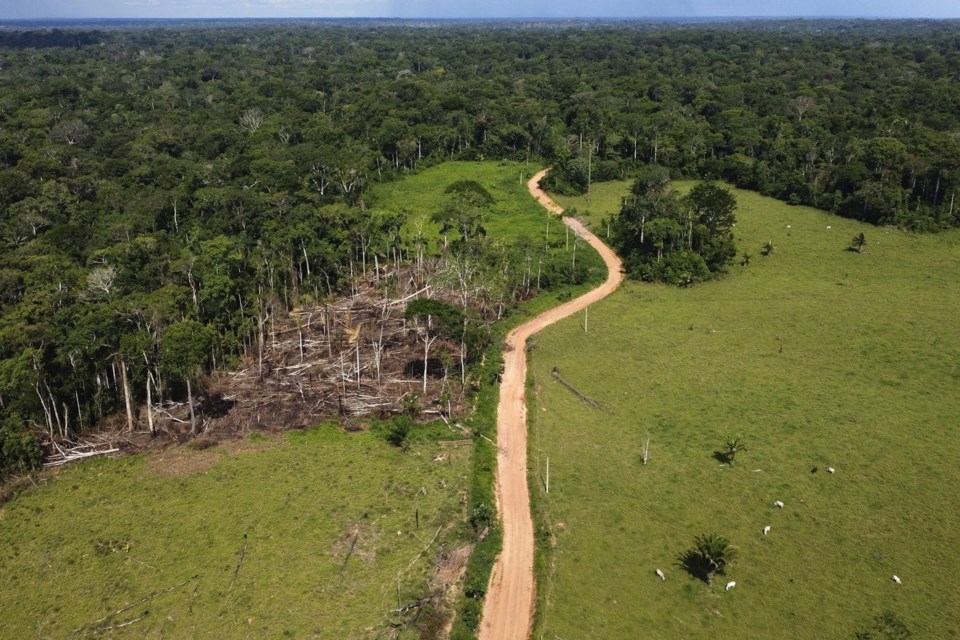BRASILIA, Brazil (AP) — The removal of hundreds of cattle raised illegally on public land designated for sustainable forest use in Brazil’s Amazon has sparked protests and divided residents, with some seeking to preserve rubber-tapping and Brazil nut harvesting and others wanting to consolidate livestock farming.
The removal operation started last week in one of the country's most renowned Amazon conservation units, the Chico Mendes Extractive Reserve, named for the famed rubber tapper and environmentalist killed in 1988. Federal agents working with police and military officials seized around 400 heads of cattle from two farmers who had failed to comply with judicial eviction orders. The raids are set to continue in the coming weeks.
But dozens of residents of the reserve protested the action, seeking to create a blockade in the city of Xapuri to prevent the removal of the cattle. The first truckload, carrying 20 head of cattle, had to take an alternate route to avoid confrontation.
The protest, which had the support of local politicians, held powerful symbolism because Xapuri is the city where Mendes was gunned down. It also represented a contrast to the 1980s, when rubber tappers fought against cattle ranchers.
The cattle removal came in response to a 56% surge in deforestation during the first five months of 2025 compared to the same period last year. The cleared area is nearly five times the size of Central Park in New York City. The reserve holds about 140,000 heads of cattle.
“Monitoring has identified that the environmental crime stems mainly from large-scale cattle ranching, which is illegal as it violates the rules of the protected area,” said a statement from the federal agency Chico Mendes Institute for Biodiversity Conservation, known as ICMBio.
The Chico Mendes Reserve is one of several Amazon extractive reserves where forest communities can practice low-impact extractive activities with protections against land developers. Rules limit deforestation to small-scale cattle raising and agriculture, and land sales are forbidden. Still, the Chico Mendes Reserve is the most deforested federal conservation unit in Brazil.
‘Working to find a solution’
The current problems worsened in the four-year term of far-right President Jair Bolsonaro that ran through 2022, when deforestation exploded in the reserve. Bolsonaro defanged environmental protection and said the Amazon had too many protected areas. Some residents of Chico Mendes began selling their land parcels illegally to farmers, who hoped they would eventually be legalized.
The strong reaction against the operation led to the creation of a WhatsApp group with around 1,000 members in which some issued threats against Raimundo Mendes de Barros, cousin and political heir of Chico Mendes, who opposes cattle expansion. But historical organizations applauded the cattle removals, including the National Council of Extractivist Populations, which issued a note supporting the operation.
Cleisson Monteiro, president of the Association of Residents and Producers of the Chico Mendes Extractive Reserve in Xapuri, backed the protests against the cattle removals. He said that while deforestation must be addressed, federal agents sparked anger and fear among families who don't comply with all the reserve's rules.
The area where the raids began, known as Seringal Nova Esperanca, “no longer has a rubber-tapper profile," Monteiro said. "The people who live there have a different way of life. They are farmers engaged in small-scale family agriculture, with some cattle ranching for beef and dairy.”
Monteiro said that about 140 families live in Nova Esperanca, including his own, all of whom have different degrees of non-compliance with the reserve's rules. He said that, even though only two individuals were targeted, there is concern that the operation could affect other families.
“ICMBio shouldn’t have acted at this moment, because we’re working to find a solution,” he said.
‘The forest can’t compete'
The reserve is home to around 4,000 families. About 900 families produce rubber for a French shoe company, Veja. The project has proven successful, but the demand is not high enough to absorb the reserve’s full production potential.
Jeffrey Hoelle, a professor of anthropology at the University of California, Santa Barbara, who has studied the area for two decades, said that cattle farming has been more lucrative for residents than traditional means of harvesting rubber and nuts from the forest.
“Twenty years ago, rubber tappers were just starting to adopt cattle. And over the last couple of decades, it’s become increasingly popular,” Hoelle said. "It’s just become more acceptable over time. But essentially, the forest can't compete in terms of economic value with cattle. The extent to which rubber and Brazil nuts can provide for people is really limited compared to cattle, for which, unfortunately, you have to cut down the forest and plant pasture."
___
The Associated Press’ climate and environmental coverage receives financial support from multiple private foundations. AP is solely responsible for all content. Find AP’s standards for working with philanthropies, a list of supporters and funded coverage areas at AP.org.
Fabiano Maisonnave, The Associated Press




